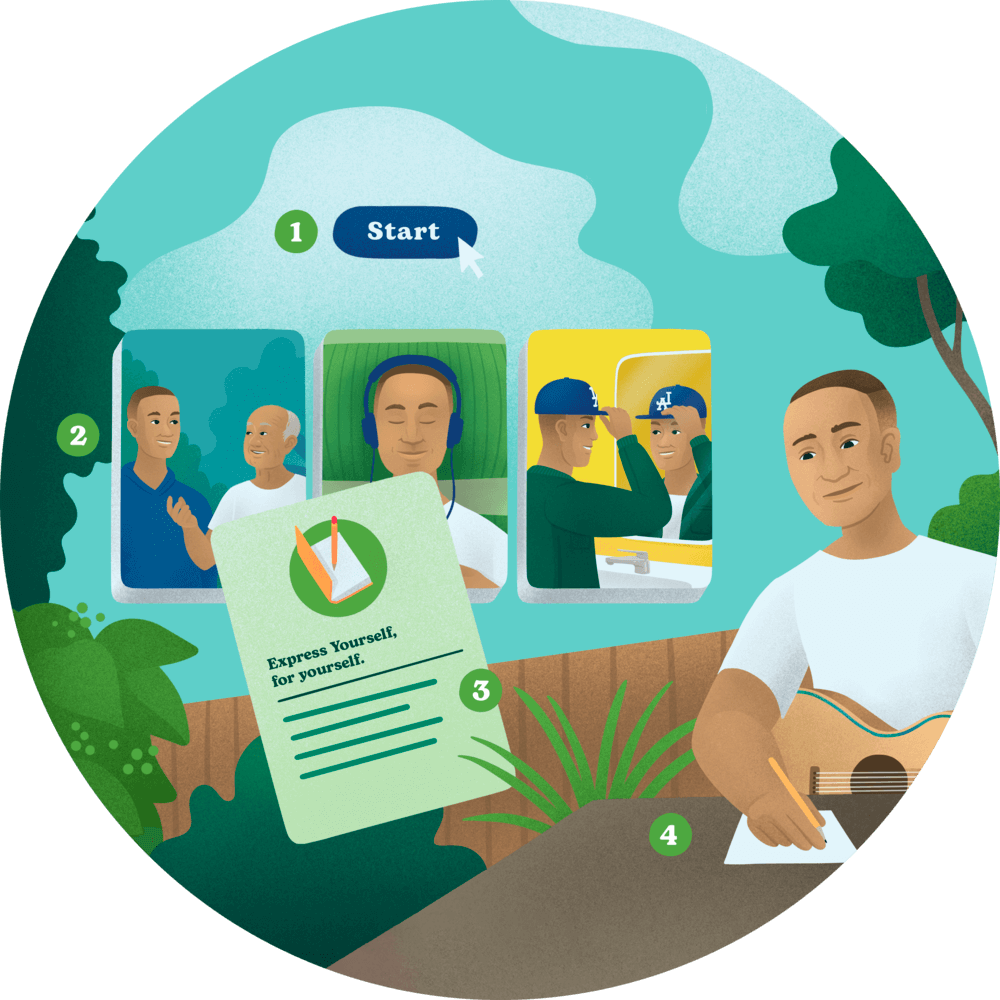
Building Self-Worth
Try activities that can help you gain a sense of self-value, boost your confidence, and build resilience for when you have a challenge to face.

What is self-worth?
Self-worth is about seeing yourself as valued or as someone who matters. We all have moments of doubt, but having a strong sense of self-worth means appreciating yourself for who you are, and having the right to “just be”. This can help boost your confidence and resilience for when you have a tough challenge to tackle.
It can take practice to separate your view of yourself from what those on the outside may think or see. Self-worth isn’t based on your accomplishments or how you compare against everyone else. Only you can measure your own self-worth.
How does Building Self-Worth help?
Building Self-Worth gives you activities you can try that might help you feel better about your sense of self. Most of these are about focusing on yourself. You can try them out during times such as…
- when you’re feeling nervous or anxious and want something energising. You might be about to present or perform in front of people at work, school or church, or are going to play against a really tough team in a sport.
- when you’re feeling a bit low. You might be alone and just want a relaxing or mindful activity to reflect on yourself or feel distracted.
- when you just want a pep talk or to feel inspired. You might’ve had a bad day or just haven’t felt like you’ve had a “win” lately.
We all find different ways to appreciate ourselves, our backgrounds, and our relationships. Some of us need a few tries before we find something that really works. When you find something you enjoy and it makes you feel good, keep that activity for yourself to use whenever you need it. Building Self-Worth is about giving you some ideas on how to start this journey.

FAQs
How is self-worth linked to confidence?
Confidence depends on trusting yourself. It involves knowing that you have the ability and skills to take on the task in front of you. Your confidence levels can change depending on what you’re doing at the time. For example, you’re fine with singing to yourself, but not in front of an audience.
Having a strong sense of self-worth means that you see yourself as valued regardless of if you have the exact abilities to take on a task. Self-worth is about giving yourself the permission to have time, attention and support, even if your confidence isn’t at its peak.
What if I can’t get in the right frame of mind to do the exercise?
If you’re still struggling to think positive things about yourself, try some techniques to de-stress and calm down. You can try our other tools, such as Deep Breathing. Stress and anxiety can get in the way of you seeing your inner strengths or feeling like you’re up for tackling a challenge.

Try Building Self-Worth now
Small Steps Toolbox
These tools have been developed to help with feelings of anxiety, stress, or low mood. Each tool only takes a few minutes. Health and wellbeing is an ongoing journey - so try them out and see what works for you.
Balancing Mood
This tool can give you insight into how what you’re doing affects your mood, and recommends activities that can improve how you’re feeling.
Understanding Loneliness
Loneliness is a common feeling we all get from time to time. The tool asks you when you feel lonely and gives insights on why or what you can do about it.
Mindful Watching
During this mindfulness exercise, you’ll be guided by relaxing audio to calmly notice different visual aspects of images and apply this to your surroundings.
Reframing Thoughts
This tool can help to identify unhelpful patterns in your thoughts and beliefs and reframe them over time to help you feel better and make decisions that support your overall sense of wellbeing.
Improving Sleep
Improving Sleep is a quiz that helps you explore the things you can do or avoid that can lead to a better quality sleep. There are a variety of tips available so you can choose something that suits your lifestyle.
Identifying Signals
During this exercise, you’ll be guided to identify sensations in your body that you often experience when feeling upset. You can use these as signals to react differently, use a tool, or engage in self-care.
Supporting Others
Supporting Others gives you tips on what you can say or do when you’re helping someone who’s going through a hard time.
Gratitude Practice
Learn to appreciate the small things in life through practising gratitude. Doing this regularly can help lift your mood and make you feel happier.
Muscle Relaxation
Teach your body how to relax better through muscle relaxation. The key is learning to apply this skill in everyday life to the entire body so that you’re not tensing muscles when you don’t need to.
Deep Breathing
This reflective technique involves slowly breathing in and out to help you feel calmer and more relaxed. This tool is guided by an animated image that inflates and deflates.
Active Listening
This skill involves fully focusing on what a person is saying, rather than selectively hearing. In this exercise, you’ll practice listening and develop an awareness of when you’re not paying attention.
